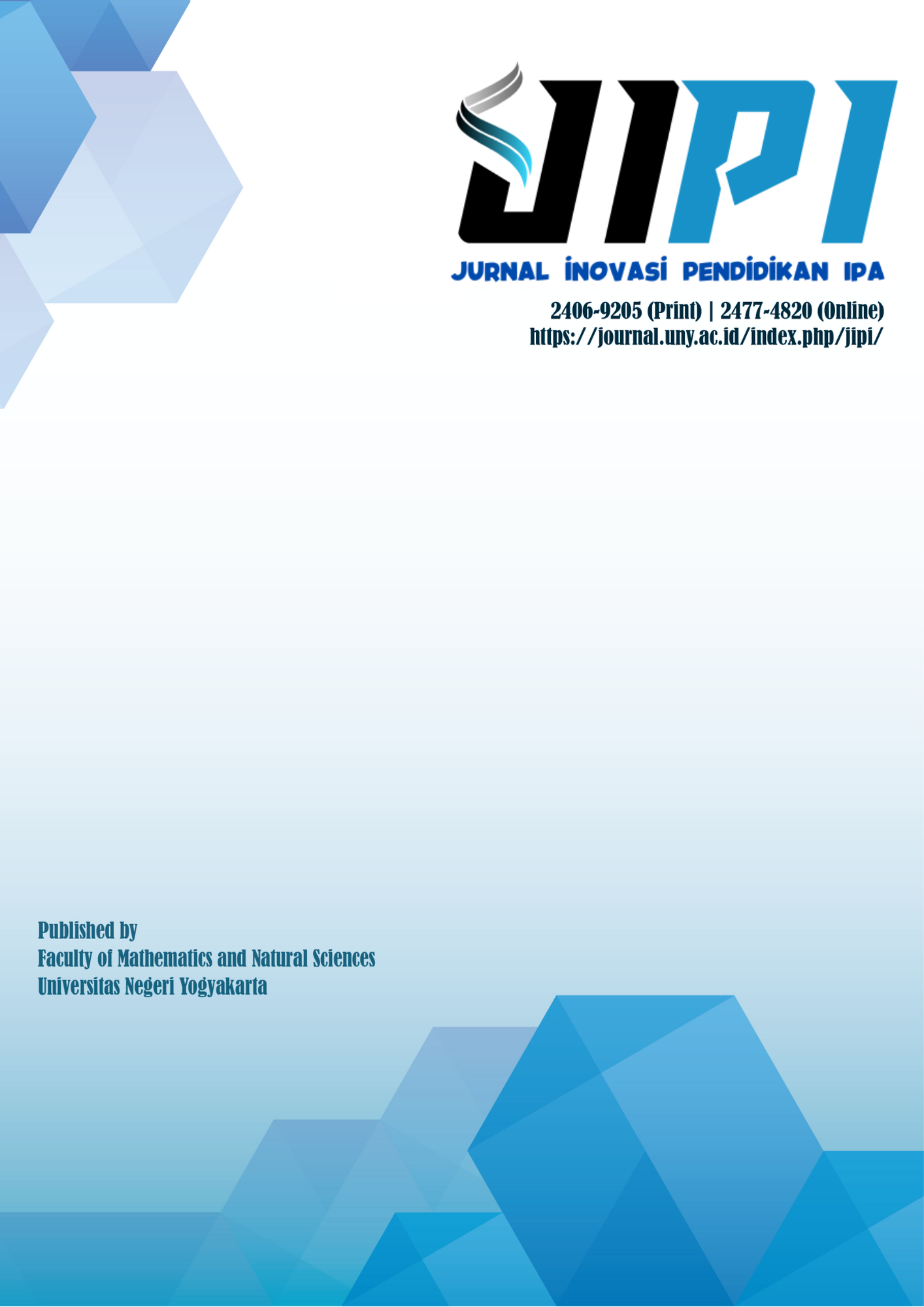Discovery learning with hierarchy concept to improve analysis ability and study achievement hydrolysis subject
DOI:
https://doi.org/10.21831/jipi.v3i2.13919Keywords:
discovery learning (DL), hydrolysis, analysis ability, classroom action research, study achievementAbstract
The aim of this research is to applied Discovery Learning (DL) by the support of hierarchy concept to improve analysis ability and chemistry study achievement in the Hydrolysis subject at eleventh-grade students of Science 1 of SMA N Karangpandan at the academic year of 2016/2017. This research is using Classroom Action Research which using two cycles. In each cycle has four steps of action, they are planning, implementing, observing, and reflecting. The research subject is the eleventh-grade students of science one which consists of 40 students. The data source is using teacher and students and the data were taken by interviewing, observing, documenting, testing, and using questionnaire. Data analysis technique is using descriptive qualitative analysis. Based on the research shows that the achievement of analysis cycle I am from 52,5% increase into 65% in the cycle II. Meanwhile, the rise in students' achievement in cognitive aspect increase from 57,5% in cycle I to 75% in cycle II. Achievement in an affective aspect in cycle I am 90% become 92,5% in cycle II. Therefore, there is the increase meant of students number in this aspect although in cycle I all of the indicator has been reached.
References
Abdelrahman, P., & Abdelrahman, K. (2014). The effect of using discovery learning strategy in teaching grammatical rules to first year general secondary student on developing their achievement and metacognitive skills, 5(2), 146–153.
Baharuddin & Wahyuni, E.N. (2010). Teori belajar & pembelajaran. Yogyakarta: Ar-ruzz Media.
Barke, H.D, Hazari, A, & Yitbarek, Sileshi. (2009). Misconceptions in chemistry. Berlin: Springer.
Dabbagh, N., & Kitsantas, A. (2012). Internet and higher education personal learning environments, social media, and self-regulated learning : A natural formula for connecting formal and informal learning. The Internet and Higher Education, 15(1), 3–8. https://doi.org/10.1016/j.iheduc.2011.06.002
Facione, P. A. (2013). Critical thinking : What it is and why it counts. California: Reasons and The California Academic Press, Millbrae, CA.
Istiana, G.A, Saputro, A.N.C & Sukardjo, J.S. (2015). Penerapan Model pembelajaran discovery learning untuk meningkatkan aktivitas dan prestasi belajar pokok bahasan larutan penyangga pada kelas XI IPA semester II SMA N 1 Ngemplak tahun pelajaran 2013/2014. Jurnal Pendidikan Kimia, 4 (2), 65-73.
Kadri, M & Rahmawati, M. (2015).Pengaruh model pembelajaran discovery learning terhadap hasil belajar siswa pada materi pokok suhu dan kalor.Jurnal Ikatan Alumni Fisika Universitas Negeri Medan, 1 (1), 29-33.
Mustafa, & Murset. (2013). Concept Maps as a tool for meaningful learning and teaching in chemistry education, 0(October), 152–164.
Novak J.D & Gowin, D.B. (2008).Learning how to learn. New York: Cambridge University Press.
Ratih, Ashari, Arif. (2015). Efektivitas Model pembelajaran discovery terbimbing dalam meningkatkan kemampuan berpikir analitis dan sikap ilmiah siswa Kelas XI SMA Negeri 3 Purworejo Tahun Pelajaran 2014/2015. Radiasi, 7(1), 1-4.
Sugiyono.(2013). Metode penelitian pendidikan. Bandung: Alfabeta.
Suprijono, A. (2014). Cooperative learning. Yogyakarta: Pustaka Pelajar.
Swaak, J, Jong, T.D & Van Joolingen, W.R. (2004).The effect of discovery learning and expository instruction on the acquisition of definitional and intuitive knowledge.Journal of Computer Assisted Learning, 20, 225-234.
Winarti. (2015). Profil kemampuan berpikir analisis dan evaluasi mahasiswa dalam mengerjakan konsep kalor. Jurnal Inovasi Dan Pembelajaran Fisika, 2(1), 19–24.
Downloads
Published
How to Cite
Issue
Section
Citation Check
License
The authors submitting a manuscript to this journal agree that, if accepted for publication, copyright publishing of the submission shall be assigned to Jurnal Inovasi Pendidikan IPA (JIPI). However, even though the journal asks for a copyright transfer, the authors retain (or are granted back) significant scholarly rights.
Jurnal Inovasi Pendidikan IPA by http://journal.uny.ac.id/index.php/jipi/index is licensed under a Creative Commons Attribution-ShareAlike 4.0 International License.










